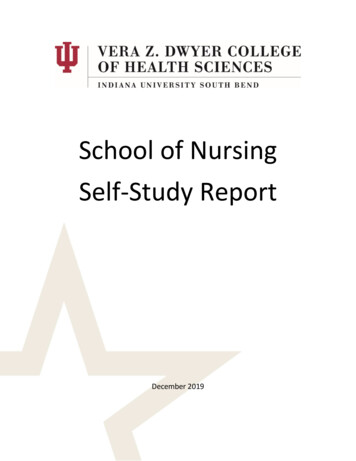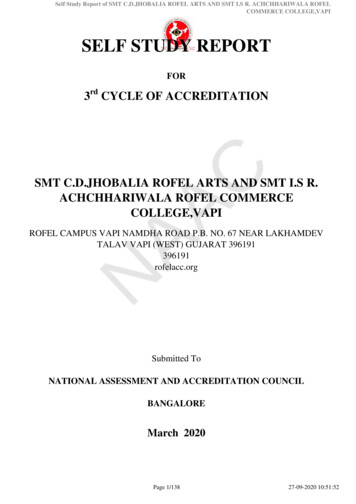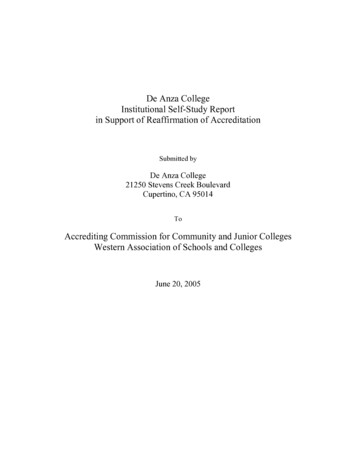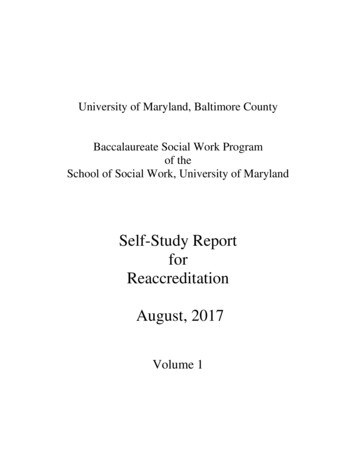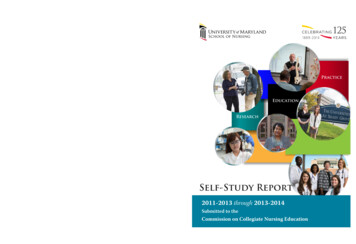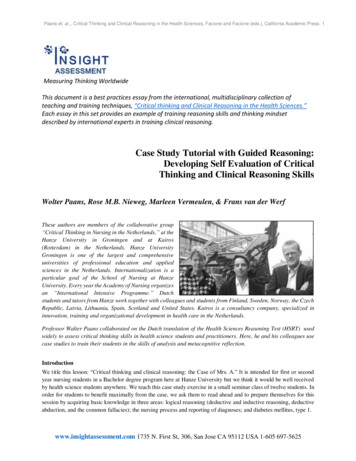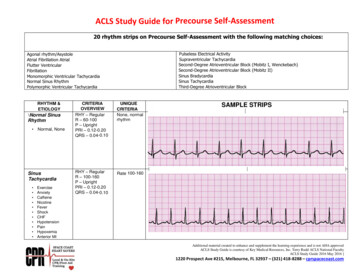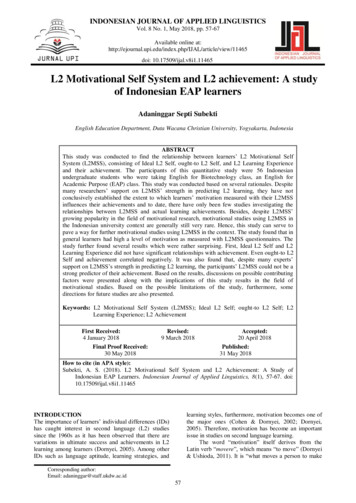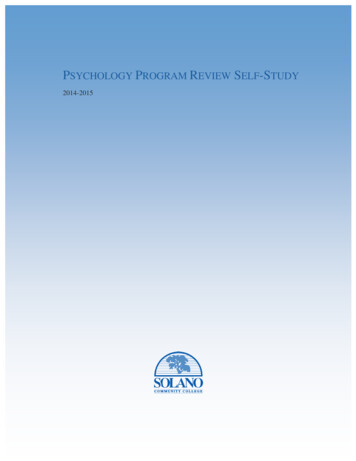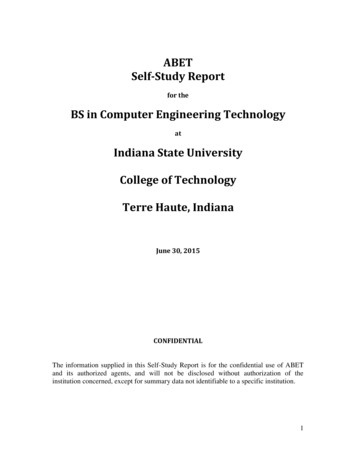
Transcription
ABETSelf-Study Reportfor theBS in Computer Engineering TechnologyatIndiana State UniversityCollege of TechnologyTerre Haute, IndianaJune 30, 2015CONFIDENTIALThe information supplied in this Self-Study Report is for the confidential use of ABETand its authorized agents, and will not be disclosed without authorization of theinstitution concerned, except for summary data not identifiable to a specific institution.1
Program Self-Study ReportforETAC of ABETReaccreditationBACKGROUND INFORMATIONA. Contact InformationDr. William Clyburn, Interim ChairElectronics & Computer Engineering Technology DepartmentIndiana State University650 Cherry StreetMyers Technology Center, RM TC301LTerre Haute, IN 47809Phone: 812.237.3456Fax: 812.237.3397Email: William.Clyburn@indstate.eduB. Program HistoryThe Computer Engineering Technology (CET) major was originally named the ComputerHardware major; originally offered in fall of 1984. The program was restructured andrenamed Computer Engineering Technology with the first courses in the new CET majoroffered fall of 2009.The CET major was reviewed by ABET during the fall of 2012. Since the fall 2012review, no significant course curriculum changes in the major have been made.Additionally, no requirements have been changed in the Foundational Studies curriculum.C. OptionsNo options, tracks or concentrations exist in the CET program. A minor in ComputerEngineering Technology is offered.D. Program Delivery ModesGenerally, all CET major courses are offered during days on campus. Courses withmultiple sections may include evening class meeting times. The classes are a mix oflecture/in-class activity based classes or a mix lecture/lab/in-class activity based classes.Blackboard is used as a supplemental tool in all courses.2
E. Program LocationsThe CET BS degree program is housed in the Department of Electronics and ComputerEngineering Technology in the Myers Technology Center, College of Technology. Allmajor courses are delivered in the Myers Technology Center facility. Mathematics,science, computer science and Foundational Studies courses are offered at a number oflocations on the ISU Terre Haute campus.F. Public DisclosureThe CET program educational objectives, student outcomes, annual enrollment andgraduation data can be found:1. On the ISU 2015-2016 Undergraduate Catalog, in the section detailing the CETmajor, on-line at:http://catalog.indstate.edu/preview program.php?catoid 24&poid 4150&returnto 619.2. On the College of Technology web site, in the section detailing the CET major, online at: http://technology.indstate.edu/cet/ rgrad programs accordion 0.G. Deficiencies, Weaknesses or Concerns from Previous Evaluation(s)and the Actions Taken to Address ThemThe most recent (first for the CET program) ABET accreditation site visit occurred onOctober 14 -16, 2012. The CET program, per the ABET report dated November 21, 2012,was found to be “well organized” and delivered “well-designed curricula” that currentlymet industry and government needs. It was noted that the CET faculty members were“well qualified, experienced and dedicated to student instruction and advising.”No deficiencies or weaknesses were cited. One program concern was delineated, statingthat “Several faculty members are at, or near, retirement age. This could place theprogram in a vulnerable position. It is recommended that the program considerdeveloping a plan that will ensure program continuity ”This concern was and continues to be recognized by the CET program faculty, the ECETdepartment, the College of Technology and university administration. Mitigating thisissue is a difficult challenge given the current climate of university budget shortfalls,pressure from FTE budgets and compounded by continued growth over the past five yearsin department and CET program enrollment. The department faculty, together with theCOT dean, has developed and is executing a stop-gap strategy for increasing facultynumbers in this difficult climate. The strategy involves bringing non-tenure trackinstructors on-board who are currently working on their PhD degree programs intechnology related fields. As they gain teaching experience as well as progress towardtheir terminal degrees, we will be in position to offer tenure-track positions to instructorswho are well aligned with our department practices and programs, furnishing continuity3
in the face of losing more experienced faculty to retirement. To date, this represents ourbest strategy to resolve the issue.Note that we have included two Personnel tables in section D, one showing FTEs for theComputer Engineering Technology Lead Faculty and the other showing FTEs for theECET department as a whole.4
GENERAL CRITERIACRITERION 1. STUDENTSA. Student AdmissionsTo qualify for general admission to the university, applicants must complete the IndianaCore 40 high school curriculum (or equivalent for non-Indiana graduates) with a gradepoint average of 2.5 on a 4.0 scale. Indiana high school graduates must have passed boththe mathematics and English sections of the Indiana Statewide Testing for EducationalProgress (ISTEP) or receive a waiver from their high school. Transfer hours are restrictedto courses in which the applicant earned a grade of “C” or higher from 100 level or highercourses from a regionally accredited college or university. In addition, some blocktransfer credit may be accepted via articulation agreements.International students must demonstrate a TOEFL score of 61 (500) minimum or anIELTS of 6 or an ELS level of 112 (successful completion).Admittance to ISU at the undergraduate level is handled by the Admissions Office.Outside of assisting Admissions with recruiting (Sycamore Preview, Experience State &arranged visits) and participation in new student orientation and initial freshman advisingand registration for classes, the program has no other involvement with the admissionprocess. A CET major freshman has the same eligibility requirements as freshmen inother majors at ISU.B. Evaluating Student PerformanceTo earn a bachelor’s degree in computer engineering technology, students must completeall required courses listed in the curriculum and have a minimum GPA of 2.0/4.0 in allcourse work completed. A t o t a l o f 1 2 0 c r e d i t h o u r s a r e r e q u i r e d f o rg r a d u a t i o n . Other requirements include a minimum of 45 hours of 300/400 levelcourses, and 30 hours of residency (for transfer students).Prerequisites for CET major courses, and all other courses, are enforced. Passing theprerequisite is necessary for the student to proceed with course registration for thefollowing semester, enforced by the ISU course registration software-based process.An ‘F’ grade in courses that are pre-requisites for other courses in the curriculum requiresthe course to be repeated.C. Transfer Students and Transfer CoursesTransfer students constitute an increasing portion in our undergraduate population. Mosttransfers come from neighboring community colleges. The main factor contributing tothis scenario is the expansion of the two-year junior college system in Indiana, whichhas been a priority for the Indiana Commission of Higher Education Commission to5
offer more affordable college education to Indiana residents. This continues to poseserious competition for enrollment at lower levels for our program. The state is alsopressing for an increase in the rate of two-year graduates continuing to pursue a four-yearbachelor degree. We therefore consider this state goal to be an opportunity for futureprogram growth, and with a strategically crafted transfer plan in place we expect transfersto remain strong in the coming years.The CET program has established articulation agreements with like programs at severalcommunity colleges that allow students to complete an associate degree t o apply creditstowards a bachelor degree at ISU. These institutions include: Ivy Tech Community Collegeand Vincennes University in Indiana, and Lakeland Community College in Illinois. Eacharticulation agreement stipulates the ISU courses that the transfer students need tocomplete, along with the requirements or guidelines that govern the agreement. An associatedegree holder from these institutions takes the so-called “block transfer”, i.e., courseswith an acceptable grade would directly substitute ISU equivalents without repeatedscrutiny. These agreements help pre-establish course equivalence and ease the transition toISU. They are also reviewed and revised if necessary every two-t o -four years to assurethe courses are well-aligned. The block transfer often, however, is not used sincecommunity college students typically bring electives or courses outside of the articulatedblock. Thus the course-by-course transfer analysis is typically used.The transfer process, at times, begins by students requesting unofficial transfer advisingwhile they are still enrolled at a community college and/or while they are registering fortheir last one or two semesters at the community college. A department faculty advisor orthe department chair handles this pre-transfer advising. Transfer students first apply and areadmitted to the university through the regular admissions process via the ISU website.Their records are evaluated first by the ISU Registrar, assigning major course credit per theTransferology web source, a CollegeSource Incorporated product. Foundational Studiestransfer credit is also assigned based on Transferology and with consultation with the ISUFoundational Studies administration. Foundational Studies transfer credit can also be achievedthrough the Statewide Transfer General Education Care (STGEC) process. The STGEC wasdeveloped by the public institutions of higher education in Indiana in response to SenateEnrolled Act 182 (2012). It enables a student who satisfactorily completes an approvedprogram of general education in any one of those institutions to transfer that course work to anyother state educational institution as a block of 30 credit hours towards the general educationcore requirements. The STGEC applies to all students matriculating at a public institution ofhigher education in Indiana in the fall of 2013 and after.The CET program is then responsible for reviewing the major transfer courses to determine whetherthey have the rigor and coverage equivalent to the courses in our curriculum. The decisionsare made based on the syllabi, course descriptions, and other supplemental material. If acourse is not judged to be suitable for substitution, a transfer-equivalence will not be granted.The department chair usually performs the major course transfer analysis andcredit assignment. There is no limit on the maximum number of hours of transfer creditwhich may be assigned towards a bachelor’s degree, however a minimum of 30 credits mustbe completed at ISU; the residency requirement. In August 2005 the department6
unanimously passed a motion to require all transfer students to complete a minimum 15credits of major courses while enrolled at ISU. We recognize that transfer credits mayoriginate from a wide variet y of educational institutions. To maintain thecurriculum integrity the program, and ISU as a general policy, does not “grandfather” creditsaccepted by other institutions and reserves the right to evaluate according to CETrequirements.D. Advising and Career GuidanceAcademic advising is an integral part of the educational process in the CET program and theCollege of Technology. The primary purpose of advising is to assist students in thedevelopment of meaningful educational plans compatible with the attainment of their lifegoals.Advisor and Student Role. Academic advising is an interactive process in which bothstudents and advisors share the responsibility. Academic advisors should foster a goodworking relationship with students, and adapt to their experiences and changing needs toassure the effectiveness of advising. By having faculty members serving in university andcollege level academic affairs committees, the CET program is able to enhanceunderstanding, affirming, and respecting the individual differences within the Universitycommunity to assure quality advising. The department and program expect advisors todevelop the knowledge, experience, and interest for successfully communicating withstudents in a genuine, sincere, accurate, and confidential manner. Students are expected tounderstand University and program requirements and accept the responsibility for fulfillingthem. Together advisors and students are expected to maintain a professional and mutuallyrespectful relationship as they review students’ progress toward the attainment of educationalobjectives.Advising Units. Advising in the CET major starts from the freshman year and will continuethrough the senior year. Students have a variety of advising resources provided by units atthe college and department level. Non-transfer freshmen are co-advised by the UniversityCollege and CET program advisors. The University College provides an intrusive advisingexperience. Upon completion of 30 credits, students matriculate from the University Collegeco-advising program, then receiving all academic and career advising from CET program anddepartment faculty. As a student progresses through the academic program, each advisingunit will play a different role, depending on the status and concern of the student. Keyadvisement personnel include:1. Associate Dean’s office. The Associate Dean is the chief administrator in the Collegeof Technology for undergraduate academics. This office oversees and addsconsistency to advising and curriculum issues across the College of Technology.Support staff work in this office, available to help students with advising, schedulingand registration, serving as a backup when department faculty are not available.2. The College of Technology central records coordinator. This role is to assist theAssociate Dean in organizing and coordinating the review of degree requirements atthe time of graduation, review and ensure proper course transfer documentation,coordinate requests for course substitutions and oversee the academic records ofstudents in the College of Technology.7
3. Academic advisor. When a student enrolls as a CET major, he/she is assigned anacademic advisor who is a full-time member of the faculty. The student will retainthis advisor as long as he/she feels advising has been productive, thereby enabling thedevelopment of a closer, more interactive relationship between the two parties.Students may request a change in their assigned advisor at any time by contacting thedepartment chair. The role of the faculty advisor is to provide general guidanceregarding CET curriculum and career paths. Each faculty advisor has a crucial role inmonitoring and advising students and in catching academic problems before theybecome serious.Advising Tools. Student progress is tracked by advisors with the Ellucian Degree Works (implemented fall 2012) academic advising and tracking tool, named MySAM by theuniversity. Students also have full access to the tool. This software application holdsacademic records including progress toward the degree, course grades, remainingcoursework to be completed, class registration tools, what-if functions for degree major orminor additions or changes and a note area for academic advisor notes and recommendations.Prior to Degree Works/MySAM the Ellucian Degree Audit Reporting System (DARS)software package was used. Students who entered the program before Fall 2012 are stillusing the DARS tool. An excerpt of a Degree Works (MySAM) report is shown in Figure1.1. The upgrade to Degree Works has been well received, giving students and advisorsadditional and more flexible academic review tools.Additional advising tools include the curriculum guide sheet, an exemplary four-year planand a degree map updated by academic advisors each semester. The guide sheet is a onepage curriculum form that itemizes all the courses required to obtain the CET BS degree, asshown in Figure 1.2. For the student’s program of study, this is a one-page form that manystudents find to be the most useful means for tracking progress toward degree completion. Aflow/prerequisite map in shown in Figure 1.3. The four-year plan, shown in Figure 1.4,arranges the curriculum in a suggested semester-by-semester track. This document alsorecommends which semesters classes are guaranteed to be offered.General Advising Policy. It is mandatory for students to arrange advisement meeting withtheir advisor at least once per semester to review their academic progress and discuss plansfor subsequent semesters during the first two years of study. The advisor will evaluate thestudent’s up-to-date information in MySAM (Degree Works) (ISU previously used DARS)and grades from the previous semester to see student data to help with advising. Themeeting is to take place prior to registering for classes each semester. All freshman andsophomore students (60 credits or less) are required to obtain advisor approval via a PINregistration permission number before they can register on-line for courses. Students at thejunior and senior rank may register for class without advisor permission, but are stronglyencouraged to meet with their academic advisor prior to registration for each upcomingsemester. A PIN number which changes each semester for each student is used to control theregistration permission process. The advisor issues the PIN number upon meeting with thestudent for advising. The approval is also indispensable when students decide to add or dropcourses from their schedule.8
Besides advisement meetings, advisors routinely monitor each student’s progress towards thedegree and work carefully to identify any deficiencies. Any issues identified arecommunicated to students through emails and, meetings if necessary. Students may alsorequest more frequent meetings depending on their needs. In addition to academic advising,students who are experiencing emotional, personal or family issues are referred todepartments on campus who can best assist in these matters. For students with documentedphysical and learning disabilities, advisors will help accommodate their special needsfollowing university guidelines. The Office of Student Success at ISU exists as a centralresource for a number of programs and tools to assist students with special needs or support.Figure 1.1 Degree Works (MySAM) Academic Record ToolNew Student Orientation. All new first-time, full-time freshmen, transfer, and internationalstudents are required to attend New Student Orientation coordinated by the Office of NewStudent Transition Programs to register for their first semester of coursework. Any freshmanwho fails to attend this program will not be allowed to register for classes before attendingthe orientation program and completing a consultation with Student Financial Aid. Duringthis orientation program the freshmen will have the first experience of academic advising.Incoming freshmen meet with University College staff and advisors, College of Technologystaff including the Associate Dean and have a one-on-one session with an academic advisorto introduce important advising tools such as the university catalog, program guide sheet, andthe Degree Works (MySAM) academic report. Advisors will assist in developing a first9
semester schedule, based on their ACT/SAT score and placement results. Additionallystudents learn to search, add or drop courses online.Mentoring. It has been part of the department’s culture for faculty to have an “open-door”policy for student visits. The primary role of mentoring encompasses general non-curriculumrelated guidance to student concerns on transition to college, employment perspective, andprofessional development, etc. Although there is no structured system for these activities, ourdepartment prides itself in creating an
The most recent (first for the CET program) ABET accreditation site visit occurred on October 14 -16, 2012. The CET program, per the ABET report dated November 21, 2012, . and Vincennes University in
